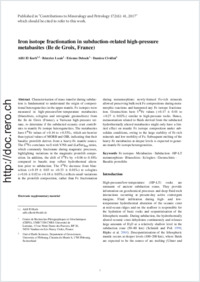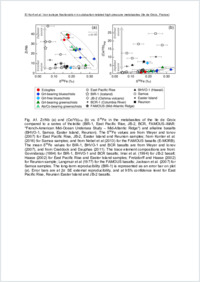Iron isotope fractionation in subduction-related high-pressure metabasites (Ile de Groix, France)
- El Korh, Afifé Centre de Recherches Pétrographiques et Géochimiques, CNRS-Université de LorraineVandœuvre-Lès-Nancy, France - Department of Geosciences, University of Fribourg, Switzerland
- Luais, Béatrice Centre de Recherches Pétrographiques et Géochimiques, CNRS-Université de LorraineVandœuvre-Lès-Nancy, France
- Deloule, Etienne Centre de Recherches Pétrographiques et Géochimiques, CNRS-Université de LorraineVandœuvre-Lès-Nancy, France
- Cividini, Damien Centre de Recherches Pétrographiques et Géochimiques, CNRS-Université de LorraineVandœuvre-Lès-Nancy, France
-
01.06.2017
Published in:
- Contributions to Mineralogy and Petrology. - 2017, vol. 172, no. 6, p. 41
Fe isotopes
Metabasites
Subduction
HP-LT metamorphism
Blueschists
Eclogites
Greenschists
Basaltic protoliths
English
Characterisation of mass transfer during subduction is fundamental to understand the origin of compositional heterogeneities in the upper mantle. Fe isotopes were measured in high-pressure/low-temperature metabasites (blueschists, eclogites and retrograde greenschists) from the Ile de Groix (France), a Variscan high-pressure terrane, to determine if the subducted oceanic crust contributes to mantle Fe isotope heterogeneities. The metabasites have δ56Fe values of +0.16 to +0.33‰, which are heavier than typical values of MORB and OIB, indicating that their basaltic protolith derives from a heavy-Fe mantle source. The δ56Fe correlates well with Y/Nb and (La/Sm)PM ratios, which commonly fractionate during magmatic processes, highlighting variations in the magmatic protolith composition. In addition, the shift of δ56Fe by +0.06 to 0.10‰ compared to basalts may reflect hydrothermal alteration prior to subduction. The δ56Fe decrease from blueschists (+0.19 ± 0.03 to +0.33 ± 0.01‰) to eclogites (+0.16 ± 0.02 to +0.18 ± 0.03‰) reflects small variations in the protolith composition, rather than Fe fractionation during metamorphism: newly- formed Fe-rich minerals allowed preserving bulk rock Fe compositions during metamorphic reactions and hampered any Fe isotope fractionation. Greenschists have δ56Fe values (+0.17 ± 0.01 to +0.27 ± 0.02‰) similar to high-pressure rocks. Hence, metasomatism related to fluids derived from the subducted hydrothermally altered metabasites might only have a limited effect on mantle Fe isotope composition under subsolidus conditions, owing to the large stability of Fe-rich minerals and low mobility of Fe. Subsequent melting of the heavy-Fe metabasites at deeper levels is expected to generate mantle Fe isotope heterogeneities.
- Faculty
- Faculté des sciences et de médecine
- Department
- Département de Géosciences
- Language
-
- English
- Classification
- Mineralogy
- License
-
License undefined
- Identifiers
-
- RERO DOC 305081
- DOI 10.1007/s00410-017-1357-x
- Persistent URL
- https://folia.unifr.ch/unifr/documents/306039
Other files
Statistics
Document views: 145
File downloads:
- pdf: 292
- Supplementary material: 145

